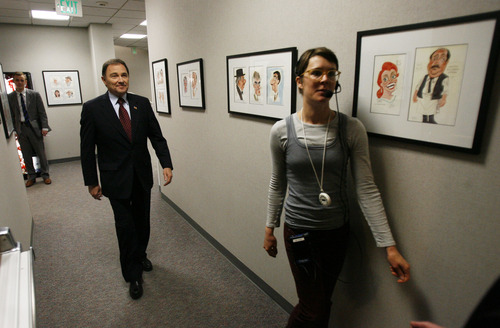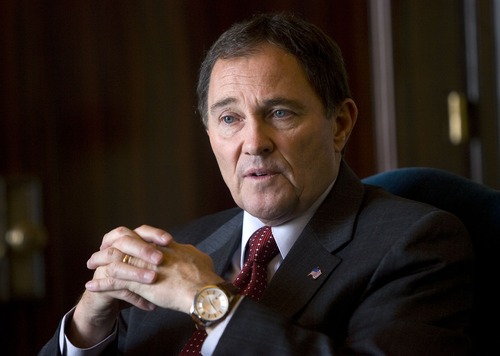This is an archived article that was published on sltrib.com in 2013, and information in the article may be outdated. It is provided only for personal research purposes and may not be reprinted.
Gov. Gary Herbert on Friday vetoed a controversial bill that would have allowed people to carry a concealed firearm without a permit. But the fight is not over, as all sides are now gearing up for a veto override battle in the Legislature.
"I have yet to receive any credible evidence that Utah's current permit process constitutes a hardship," Herbert wrote in a veto letter to legislative leaders. He added that HB76's proposed removal of the existing permit provision in state law, scraps a system that "has been in place for decades, and in its current form for more than 15 years. In that time, it has become a national model."
Sen. Allen Christensen, R-North Ogden, the Senate sponsor of the bill, accused the governor of "buckling into the fear of guns right now."
HB76, Christensen said, "is just reaffirming our constitutional rights to carry a sidearm, a weapon. It changes basically nothing except that you can cover it up" with such things as coat in the rain.
Clark Aposhian, chairman of the Utah Shooting Sports Council, said he wasn't surprised by Herbert's veto and "I don't see it as buckling to one side or another."
He said the governor had made "clear" that he opposed the bill all along, adding, "But we're disappointed in his veto."
Anti-gun violence groups hailed Herbert's action.
"I think it showed courage on the governor's part, and good sense. The governor has said all along that he didn't like the bill and that he didn't see a reason to change the existing system. So his action is consistent with his words, which is refreshing in a politician," said Steve Gunn, a board member of the Gun Violence Prevention Center.
Monica Bellenger, cofounder of Utah Parents Against Gun Violence, said, "We feel that the current process to obtain a conceal carry permit in Utah is important, an important screening tool, and that the system works. We're very, very proud that he took this step."
Public safety • Herbert noted in his veto letter that he is a gun owner and a concealed firearm permit holder — and said the class required for permits helps protect the public safety.
"In that class, we reviewed Utah's firearm laws. The training explained under what circumstances a weapon may be drawn in self defense under Utah law," he wrote. "Both gun owners and the people of Utah benefit by having concealed firearm carriers receive and understand this information prior to receiving a permit."
Herbert also said the current system "prevents people who have been convicted of certain crimes from lawfully carrying a concealed weapon, including those who have been convicted of a violent crime," as well as revoking permits for those who have demonstrated they are a danger to themselves or others.
Among requirements for obtaining a permit is completion of a criminal background check. And, in recent years, the state Bureau of Criminal Identification, which oversees the program, has implemented a daily automated check designed to weed out those permit holders who should have their licenses revoked.
"I have received dozens of letters from law enforcement agencies opposing the bill," Herbert said, adding chiefs of police see it as a "'dramatic change in Utah's concealed carry permitting process that has been fair for the public, public safety, and concealed carry permit holders.' I agree."
Among others who had asked Herbert to veto the bill were Catholic Diocese of Salt Lake City, the League of Women Voters and Parents Against Gun Violence.
HB76 was the highest profile measure among several bills seen as a gun-rights counter-punch to President Barack Obama's push for expanded background checks, limited magazine capacities and bans on semi-automatic rifles after the mass shooting at Newtown, Conn.'s Sandy Hook Elementary School in December. The massacre killed 20 first-graders — including Utah native Emilie Parker — and six adults.
Lawmakers defeated several other gun-rights measures, including one that would have attempted to elevate state gun laws over federal firearms laws and another that would have barred police from citing a person with disorderly conduct merely for displaying a gun openly.
Herbert "put himself as a parent before a politician" in vetoing HB76 to "send a signal this is not the right bill at the right time and certainly not the right solution to avoiding potential Newtown disasters," said Thomas Panuzio, a Salt Lake City resident who grew up 20 minutes outside of Newtown and recently founded securingourschools.org.
Reason for the bill • The sponsor of HB76, Rep. John Mathis, R-Vernal, has repeatedly said the bill was simply a protection for ranchers who might find themselves in violation of the law by accidentally covering a gun while putting on a raincoat.
Herbert wrote in his veto letter, "I understand that concern, but am unwilling to discard an entire system that benefits the people of Utah and is supported by law enforcement when there could be a solution more narrowly tailored to address that issue."
Herbert during the legislative session repeatedly signaled his opposition to the bill, although he never threatened a veto outright.
Nevertheless, the bill passed 21-7 in the Senate and 51-18 in the House. Both vote totals — if they were to hold — would be sufficient to override the veto if lawmakers decide to challenge it. An override requires at least 50 votes in the House and 20 in the Senate.
Senate President Wayne Niederhauser, R-Sandy, said legislative leaders will wait until after April 3 —the deadline for Herbert to sign bills — to see how many other bills could face attempts at a veto override. Then they will poll members about how many want an override session.
"I know HB76 passed both houses with a two-thirds vote," Niederhauser said. "But I really don't know how hard or how soft that vote is. We won't know until we do our polling."
House Speaker Becky Lockhart, R-Provo, said House members would be "thoughtful and methodical and evaluate whether or not they want to go into override. It's a pretty serious thing."
While Christensen said he and others will push for a veto override, he does not know how strong of an appetite lawmakers have for that.
"When it comes to pushing back that strongly, there are a lot of those votes that were not emphatic. They were 'yes' votes for the bill — but will they hold up? I would certainly like to see the override happen, and I will be pushing for it. I would hesitate to try to guess at the results of an override session," Christensen said.
Lobbying • Aposhian said his shooting sports council board will meet next week to see what steps it may take to seek an override. He adds he will try to schedule meetings with several legislators to talk about how it could help with a push for an override.
With a possible override fight looming, Bellenger said her anti-violence group will continue to encourage people to call legislators to ask them to vote against it.
Similarly, Maryann Martindale, executive director of Alliance for a Better Utah, noted 1,200 people signed a petition against HB76, and said, "It would be contrary to the wishes of the overwhelming majority of Utahns who favor sensible gun rights to override the governor's veto..... We call on the citizens of Utah to tell their legislators not to override the veto."
If Herbert had signed the bill, Utah would have joined about a half dozen other states with constitutional-carry laws on the books, including Vermont, Arizona, Wyoming and Montana.
Utah is the second Republican governor in a week to veto a bill legalizing concealed carry without a permit. South Dakota Gov. Dennis Daugaard vetoed his state Legislature's measure March 15 and lawmakers were unable to muster sufficient votes to override him.





